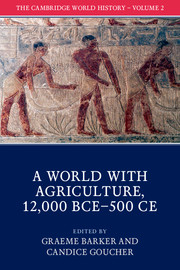Book contents
- The Cambridge World HistoryVolume II
- The Cambridge World History
- A World with Agriculture, 12,000 bce–500 ce
- Copyright page
- Contents
- Figures
- Maps
- Tables
- Contributors
- Preface
- 1 Introduction
- 2 Archaeogenetics
- 3 Agricultural origins
- 4 What did agriculture do for us?
- 5 Communities
- 6 Pastoralism
- 7 Agriculture and urbanism
- 8 Early agriculture in Southwest Asia
- 9 ’Ain Ghazal, Jordan
- 10 Early agriculture in South Asia
- 11 Mehrgarh, Pakistan
- 12 Early agriculture in China
- 13 Xinglonggou, China
- 14 Early agriculture in Japan
- 15 The Nara basin paddies, Japan
- 16 Early agriculture in Southeast Asia and the Pacific
- 17 Swamp cultivators at Kuk, New Guinea
- 18 Early agriculture in sub-Saharan Africa to c. 500 ce
- 19 The Tichitt tradition in the West African Sahel
- 20 Early agriculture in the Americas
- 21 Nanchoc valley, Peru
- 22 Early agricultural society in Europe
- 23 Pioneer farmers at Brześć Kujawski, Poland
- Index
- References
4 - What did agriculture do for us?
The bioarchaeology of health and diet
Published online by Cambridge University Press: 05 May 2015
- The Cambridge World HistoryVolume II
- The Cambridge World History
- A World with Agriculture, 12,000 bce–500 ce
- Copyright page
- Contents
- Figures
- Maps
- Tables
- Contributors
- Preface
- 1 Introduction
- 2 Archaeogenetics
- 3 Agricultural origins
- 4 What did agriculture do for us?
- 5 Communities
- 6 Pastoralism
- 7 Agriculture and urbanism
- 8 Early agriculture in Southwest Asia
- 9 ’Ain Ghazal, Jordan
- 10 Early agriculture in South Asia
- 11 Mehrgarh, Pakistan
- 12 Early agriculture in China
- 13 Xinglonggou, China
- 14 Early agriculture in Japan
- 15 The Nara basin paddies, Japan
- 16 Early agriculture in Southeast Asia and the Pacific
- 17 Swamp cultivators at Kuk, New Guinea
- 18 Early agriculture in sub-Saharan Africa to c. 500 ce
- 19 The Tichitt tradition in the West African Sahel
- 20 Early agriculture in the Americas
- 21 Nanchoc valley, Peru
- 22 Early agricultural society in Europe
- 23 Pioneer farmers at Brześć Kujawski, Poland
- Index
- References
Summary
- Type
- Chapter
- Information
- The Cambridge World History , pp. 93 - 123Publisher: Cambridge University PressPrint publication year: 2015
References
Further reading
- 2
- Cited by



